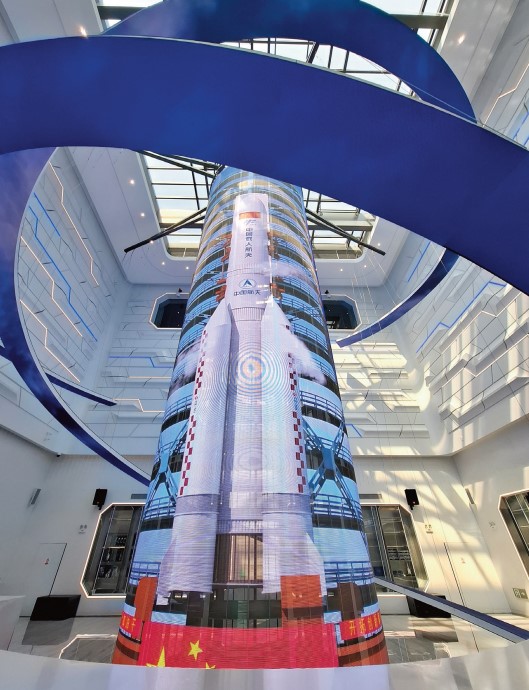New technologies, favorable policies and inclusiveness – Chinese formula for continuous economic growth

Innovation in the private sector moves the development of the Chinese economy
The launch of a rocket shown in an informative video presentation for visitors to the Space Center for Supercomplication « Warring » in the southernmost Chinese province of Hainan symbolically represents the commitment of the Chinese private sector to innovation, which is expected to be the Chinese economy.
Chinese private companies, through the development of the domestic market, but also with competition on the international stage, thanks to their innovative products and technological discoveries, have already become a key force that drives the high -quality rise and growth of the Chinese economy. And it is precisely the transformation of Hainan to one of the world’s largest free trade ports, within the framework of China’s economic opening, also attracts many private companies and investors on the island. « Warring » is actually the only center for supercompluses built and driven by private companies.
China’s private sector contributes to more than 60 percent of GDP (GDP), 70 percent of technological innovation and 80 percent of urban job employment, official data show. A total of 55 million registered private companies in the country made up over 92 percent of all businesses in China, according to information from September last year.
Rapid adoption of new technologies optimizes the functioning of
companies
Chinese private companies are quickly accepting new technologies such as artificial intelligence (VI), inventions in the low -level economy (refers to airspace to a thousand meters) and the use of renewable energy sources to improve efficiency, reduce costs and encourage innovations. They use artificial intelligence to optimize supply chains, manage reserves and automate operations. And also invest in low -altitude aviation technology, including the development of light aircraft and drones for industrial and logistical application. It is expected that this sector will make significant progress. The Chinese Civil Aviation Administration (HAAF) estimates that the Chinese economy at low heights will make a market value of over $ 200 billion this year, exceeding $ 480 billion by 2035.
– Space technology in China is developing rapidly and we have a lot of scenarios to use the best technologies, as well as high demand on the Chinese market whose potential is huge. I believe that the space industry will develop at a higher level in the next 20 years – said Jeshi Young, President of the Wedding Space Center for Supercomplication.
The latest technologies, as Young point out, are also used to reduce energy consumption at the Super Comp.
– We are dedicated to green development. We use the latest and most innovative technologies to reduce energy consumption at the Super Comp. We are doing everything in our possibilities to use renewable energy sources, such as solar and wind energy, in order to reduce consumption and carbon print and to minimize environmental impact – said Young.
An example of the successful application of modern technologies is the recent presentation of the drone company Efi Hainan Technologies (Efy Hainan Technology Co.). A company, considered a rising star in the low -altitude industry, has expanded its operations to over 200 cities around the world since coming to Hinan in 2019, including locations in the United States, Japan, the United Arab Emirates, Malaysia, Algeria… During that period, over two thousand performances. ECI Technologies’ commitment to innovation is also observed in presenting new drone models by the company almost every year, in order to respond to market needs.
Innovation vitality in private sector inseparable by state policies
The rise of innovation vitality of private enterprises is inseparable from state policies. In recent years, from the central and local authorities, a series of political measures have been introduced to promote the development and growth of the private economy. In terms of tax incentives, data released by the State Tax Administration show that last year total tax cuts – taxes and tax returns, from the main policies that support scientific and technological innovation, as well as production development, reached 262.93 billion yuan (32.8 billion). Among them, taxpayers in the private economy (including private companies and self -employed) had 158.7 billion yuan (19.8 billion euros) in tax cuts, taxi reductions and tax refunds related to these policies, which is more than 60 percent.
« Tax cuts and taxes have made it easier for companies, enabling them to invest more funds in innovation, research and development, » say Chinese journalists reporting from the Boao Forum for Asia, held in Hainan from March 25 to 28.
Fair market competition is also a guarantee of the continuous innovation of private enterprises. From April 20 this year, measures to implement the regulations for examination of fair competition, issued by the State Administration for Market Regulation, will take effect. The regulations for examination of fair competition, meanwhile, are valid since August last year. They clearly require the performance and verification of fair competition in the market in drafting laws, administrative regulations, local regulations, rules, regulatory documents and concrete measures of policy related to business operators’ economic activities. The introduction of these measures aims to specify the appropriate regulatory regulations.
Corporate culture stimulates commitment to innovation
Private enterprises are also extremely aware of the importance of quality staff and are actively taking various measures to attract and retain highly capable workers. On the one hand, companies attract outstanding domestic and foreign talented staff by offering competitive salaries, a good work environment and space for development. Certain Internet technology companies provide high salaries, stock options and other stimuli for quality staff, attracting a large number of top workers to join and promote the innovation and development of enterprises in areas such as artificial intelligence and large data. On the other hand, companies also pay attention to internal creation of quality staff. They improve the professional skills and innovative skills of employees through training courses, mentoring and project practices. Some traditional manufacturing companies are collaborating with universities and expert colleges to carry out an order « based on order », training a group of qualified students whose skills should serve to achieve the company’s industrial upgrade goals.
Private companies fully respect the innovative and creative spirit of talented staff, giving them enough autonomy and space for innovation. They encourage employees to explore boldly and adopt a tolerant attitude towards possible failures in searching for innovation. This open and inclusive corporate culture stimulates employees’ commitment to innovation. At the same time, private companies actively promote communication and cooperation between employees. With the establishment of teams for innovation and implementation of inter -sectoral project collaboration, companies encourage the exchange of ideas between staff from different spheres, creating fertile innovation ground.
Taking into account all the works applied, you can get a play how the Chinese private sector has become a key driving force for China’s economic progress over the past decades, as well as a pillar of the nation’s innovation impetus.
Milko Zivkovic, our rapporteur from Beijing








